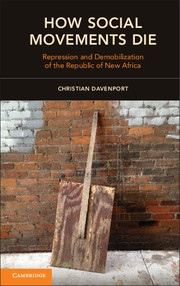3 - Repression and Red Squads
Published online by Cambridge University Press: 05 December 2014
Summary
What is the role of the government in the context of behavioral challenges to authorities, and what is the role of the government in the specific context of Detroit and the Republic of New Africa (i.e., how is government involved with the repressive policies used to subdue the organization, what exactly does it do, and what type of information is collected to assist with these efforts)? As I attempt to contextualize the US-RNA interaction into literature concerning state repression and to discuss what information is used to evaluate the argument put forward earlier, these are the questions that I address within the current chapter.
Why Repress?
Although several different reasons for state repression have been advanced, none has the resonance or standing of the desire to counter behavioral challenges. Indeed, it seems uncontroversial to say that governments are interested in keeping challenges and challengers within parameters that they deem acceptable (see Tilly 1978 for useful discussion). Although this varies somewhat from place to place and time to time, I would argue that several elements of this process are fairly stable. For example, political authorities consistently like to keep the goals of any challenge or challenger as moderate as possible (i.e., not advocating the overthrow of the existing political-economy and/or removal of individuals associated with it), the behavior of these challengers nonviolent, and the number of participants in relevant activity small. Now any deviations from one of these preferred states may communicate to authorities (as well as to the mass citizenry) that there is a “threat” to political order. Indeed, any one of these may threaten the perception that the existing government is in control of the relevant territory and that all those under their jurisdiction can exist without the fear of something bad happening to them or their interests (e.g., their property being damaged or destroyed and their lives taken or irreparably damaged). If several of these dimensions are present at the same time (e.g., there is a radical transformation proposed and the challenge is violent in nature or the challenge is violent and the number of participants is significant), then the magnitude of the threat will be increased. If all three dimensions are present, then one has a situation of civil war and/or what many would call “anarchy” or “state failure,” situations where some centralized authority has failed in its attempt to wield coercive control over a specific territorial jurisdiction.
- Type
- Chapter
- Information
- How Social Movements DieRepression and Demobilization of the Republic of New Africa, pp. 61 - 79Publisher: Cambridge University PressPrint publication year: 2014



